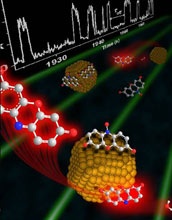Researchers at Cornell University recently made a major breakthrough when they invented a method to test and demonstrate a long-held hypothesis that some very, very small metal particles work much better than others in various chemical processes such as converting chemical energy to electricity in fuel cells or reducing automobile pollution.
 Nanoscale metal particles naturally have a wide variety of shapes and sizes and chemists long suspected that some particles work much better than others when it comes to catalyzing chemical processes. Researchers at Cornell University recently confirmed the hypothesis and discovered that some nanoparticles randomly change from good particles to bad particles. Credit: Courtesy of Cornell University
Nanoscale metal particles naturally have a wide variety of shapes and sizes and chemists long suspected that some particles work much better than others when it comes to catalyzing chemical processes. Researchers at Cornell University recently confirmed the hypothesis and discovered that some nanoparticles randomly change from good particles to bad particles. Credit: Courtesy of Cornell University
The breakthrough, reported in this week's edition of the journal Nature Materials, also came with a surprise. By devising a way to watch individual molecules react with a single nanoscale particle of gold in real time, researchers confirmed that some gold particles are better at increasing the rate of a chemical reaction than others, but they also found that a good catalyst sometimes spontaneously turns bad.
Understanding why these particles change and how to stabilize the "good" particles may lead to solutions for a wide range of problems such as the current global energy challenge.